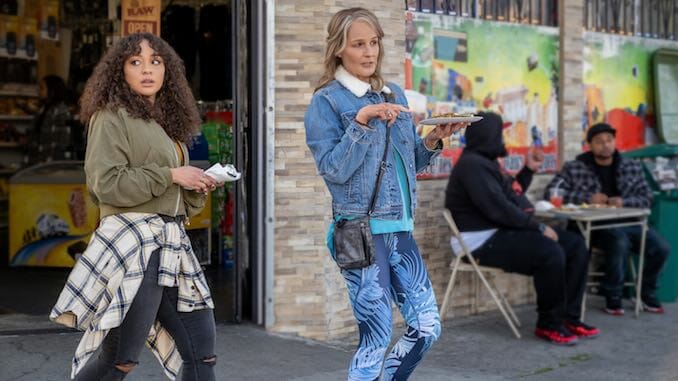Starz’s Blindspotting Series Successfully Shifts the Film’s Story to Its Women
Photo Courtesy of Starz
Written by and starring Daveed Diggs and Rafael Casal, the film Blindspotting premiered at Sundance in 2018 with a wide release later that year. It follows childhood best friends Collin (Diggs) and Miles (Casal) as they attempt to maneuver a rapidly gentrifying Oakland. Collin is trying to keep his head down and make it through the last three days of his probation, but Miles is impulsive and has a quicker temper. The friends’ relationship is tested after Collin witnesses a white cop fatally shoot an unarmed Black man, causing him to develop nightmares and even hallucinations. The film received critical acclaim, and has now been adapted into an eight-episode television series on Starz—but because the show is a continuation of this story’s world and not a direct sequel, it’s not necessary to have seen the film before jumping into the series.
Set six months after the events of the Blindspotting film, the show opens with Miles getting arrested on New Year’s Eve 2018. Ashley (Jasmine Cephas-Jones), his ride-or-die girlfriend and mother of their six-year-old Sean, comes home just in time to see Miles put in the back of a squad car while the cops bring out a baggie of white pills. Proving to be as reckless as we knew him before, Miles curses in the backseat while Ashley clinks two bottles of champagne together, alone on the stoop. With this, the narrative shifts seamlessly from the film’s focus on Miles and Collin to Ashley and Sean.
Despite the film centering around him, Diggs’ character Collin doesn’t play a central role in the series. However, Diggs and Casal both wrote and executive produced the show, with the team of Jess Wu Calder and Keith Calder (One Night in Miami…, Anomalisa) also returning as executive producers. Moving away from Collin’s story with just a few passing comments, Blindspotting successfully glides beyond the world of the film, giving more depth into those who are affected by the carceral system on the periphery. Miles’ arrest sends shockwaves through his family and friends, and the women in his life have to adjust the most. His sister, mother, and partner all have to come together to make sure his son Sean is safe and happy, attempting to minimize the trauma of his father being in prison. The series’ concern for those on the other side of the plexiglass visitation window is a well-developed departure from the film.
Now left to pick up the pieces of his arrest, Ashley and Sean move into a house with Rainey (Helen Hunt), Miles’ well-intentioned and sometimes cringe-worthy mom. She loves Ashley and Sean deeply and is happy to invite them into her home, but her efforts to be a good ally to her Black grandson and future daughter-in-law sometimes miss the mark. In the film, Miles is criticized for being a white boy who acts Black, and the series explores this further by introducing us to both Rainey and Trish (Jaylen Barron), Miles’ Black half-sister who lives at home. Meeting Rainey also explains some of Miles’ occasional, inadvertent tone-deafness; after his arraignment, Rainey gets balloons for the home that have emblems of Africa plastered across them, supposedly trying to make Ashley and Sean more comfortable.
Barron, who previously guest-starred on Shameless, gives a standout performance as the troubled Trish. She’s brash and self-assured, and openly claims to hate Ashley for straining her relationship with her brother. Trish is also a self-proclaimed hustler and has big dreams of opening a safe, cooperatively-owned club. The first time we visit Rainey’s, we see Trish and her posse romping around the home in lingerie, dancing to music, and taking videos in front of elaborate ring-light set-ups. It gives a clear picture of Rainey and Trish’s relationship; Trish argues against Rainey’s claims that the girls aren’t using the house as a workspace as they agreed to, reminding her mother they’re sex workers and this is work. Rather than disapprove of Trish’s lifestyle, Rainey reminds her that she was “in the room with Carol Leigh” when she coined the term sex worker. Supportive but not a pushover, Rainey tries to impart some historical wisdom on her daughter who’s simply far too headstrong to hear her.